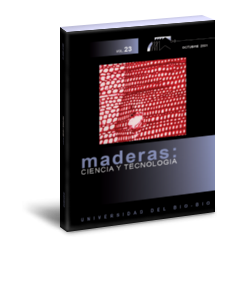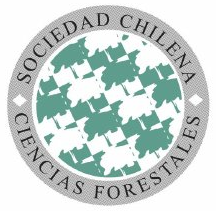Biochemical features of organic extractives from Eucalyptus and Corymbia woods using ethanol as a solvent
DOI:
https://doi.org/10.4067/s0718-221x2021000100458Keywords:
Chemical characteristics, condensed tannins, natural extractives, ethanol extraction, infraredAbstract
The objective of this study is to evaluate chemical characteristics, as well as antioxidant and antibacterial activities of organic compounds extracted from three Eucalyptus woods and Corymbia maculate wood using ethanol as a solvent. To obtain the ethanolic extracts, 15 g of a powdered wood sample was mixed with 150 mL of ethyl alcohol 99 % PA by constant mechanical stirring, which was further magnetically mixed at 60 ºC for 24 h. The extractives were analyzed by means of percent yield, Fourier-transform infrared spectrum, inhibitory index (measured after antimicrobial tests), antioxidant activity, and condensed tannins content. The Eucalyptus dunnii extract showed the highest percent yield. The infrared spectra of all the extractives presented similar profiles, with remarkable bands ascribed to the presence of lipophilic extracts, sterols, fatty acids, and other hydroxylated substances, such as carbohydrates and phenolic compounds. In all cases, the higher the concentration of the extractive was, the higher the antioxidant activity was. The antioxidant activity of Eucalyptus saligna extract stood out since overcame that of the positive control (ascorbic acid). Regarding the condensed tannins content, that extract from Eucalyptus grandis excelled.
Downloads
References
Abdul Mudalip, S.K.; Abu Bakar, M.R.; Adam, F.; Jamal, P. 2013. Structures and Hydrogen Bonding Recognition of Mefenamic Acid Form I Crystals in Mefenamic
Acid/Ethanol Solution. Int J Chem Eng Appl 4: 124-128. https://doi.org/10.7763/IJCEA.2013.V4.277
Albuquerque, C.J.B.; Silva, S.M.; Luz, J.M.Q.; Zandonadi, C.H. 2017. Consortium of Eucalyptus with forage sorghum in semiarid of Minas Gerais State. Cienc Rural 47 (11). https://doi.org/10.1590/0103-8478cr20160939
Andrew, R.L.; Keszei, A.; Foley, W.J. 2013. Intensive sampling identifies previously unknown chemotypes, population divergence and biosynthetic connections among terpenoids in Eucalyptus tricarpa. Phytochem Rev 94: 148–158. http://dx.doi.org/10.1016/j.phytochem.2013.05.002
Bandoniene, D.; Murkovic, M. 2002. On line HPLC-DPPH screening method for evaluation of radical scavenging phenols extracted from apples (Malus domestica L). J Agric Food Chem 50 (9): 2482-2487. https://doi.org/10.1021/jf011475s
Brand-Wiliams, W.; Cuvelier, M. E.; Berset, C. 1995. Use of a free radical method to evaluate antioxidant activity. LWT 28: 25-30. https://doi.org/10.1016/S0023-6438(95)80008-5
Brown, R.H.; Mueller-Harvey, I.; Zeller, W.E.; Reinhardt, L.; Stringano, E.; Gea, A.; Hardcastle, E.E. 2017. Facile Purification of Milligram to Gram Quantities of Condensed Tannins According to Mean Degree of Polymerization and Flavan-3-ol Subunit Composition. J. Agric Food Chem 65(36): 8072–8082. http://dx.doi.org/10.1021/acs.jafc.7b03489
Chang, R. 2000. Análise dos compostos fenólicos da madeira do E. grandis e do E. urophilla do triângulo mineiro. Msc. Thesis, Federal University of Uberlândia, UFU. Uberlândia, brazil. https://repositorio.ufu.br/handle/123456789/27011
Clinical and Laboratory Standards Institute (CLSI), 2017. Available in: https://clsi.org
Estanislau, A.A.; Barros, F.A.S.; Peña, A.P.; Santos, S.C.; Ferri, P.H.; Paula, J.R. 2001. Composição química e atividade antibacteriana dos óleos essenciais de cinco espécies de Eucalyptus cuItivadas em Goiás. Rev Bras Farmacogn 11(2): 95-100. http://dx.doi.org/10.1590/S0102-695X2001000200005
Gomes, F.; Canhoto, J.M. 2003. Micropropagation of Eucalyptus nitens Maiden (Shining gum). In Vitro Cell Dev Biol-Plant 39: 316–321. http://dx.doi.org/10.1079/IVP2002376
Gómez, M.E.L.D.B. 2003. Modulação da composição de ácidos graxos poliinsaturados ômega 3 de ovos e tecidos de galinhas poedeiras, através da dieta. I. Estabilidade oxidativa. PhD. Thesis, University of São Paulo, USP/FCF. São Paulo, Brazil. http://dx.doi.org/10.11606/T.9.2003.tde-02062003-150007
Gomide, J.L.; Fantuzzi Neto, H.; Regazzi, A.J. 2010. Análise de critérios de qualidade da madeira de eucalipto para produção de celulose kraft. Rev Árvore 34(2): 339–344. http://dx.doi.org/10.1590/s0100-67622010000200017
Gullichsen, J.; Paulapuro, H. 1999. Forest products. (3) chemistry. Per Stenius (Ed.), Espoo, Finland. https://www.puunjalostusinsinoorit.fi/en/shop/vol-3-forest-products-chemistry/.
Hayat, Z.; Cherian, G.; Pasha, T.N.; Khattak, F.M.; Jabbar, M.A. 2010. Oxidative stability and lipid components of eggs from flax‑fed hens: effect of dietary antioxidants and storage. Poult Sci 89: 1285‑1292. https://doi.org/10.3382/ps.2009-00256
Hofmann, T.; Nebehaj, E.; Stefanovits-Bányai, É.; Albert, L. 2015. Antioxidant capacity and total phenol content of beech (Fagus sylvatica L.) bark extracts. Ind Crops Prod 77: 375–381. https://doi:10.1016/j.indcrop.2015.09.008
Hras, A.R.; Hadolin, M.; Knez, Z.; Bauman, D. 2000. Comparison of antioxidative and synergistic effects pf rosemary extract with α-tocopherol, ascorbyl palmitate and citric acid in sunflower oil. Food Chem 71(2): 229-233. http://dx.doi.org/10.1016/S0308-8146(00)00161-8
Jiang, P.; Xiong, J.; Wang, F.; Grace, M.H.; Lila, M.A.; Xu, R. 2017. α-Amylase and α-Glucosidase Inhibitory Activities of Phenolic Extracts from Eucalyptus grandis × E. urophylla Bark. J Chem 1:7. http://dx.doi.org/10.1155/2017/8516964
Kirker, G.T.; Bishell, A.B.; Lebow, P.K. 2015. Laboratory Evaluations of Durability of Southern Pine Pressure Treated With Extractives From Durable Wood Species. J Econ Entomol 109(1): 259–266. http://dx.doi.org/10.1093/jee/tov286
Luna, A.; Lábaque, M.C.; Zygadlo, J.A.; Marin, R.H. 2010. Effects of thymol and carvacrol feed supplementation on lipid oxidation in broiler meat. Poult Sci 89: 366‑370. http://dx.doi.org/10.3382/ps.2009-00130
Missio, A.L.; Tischer, B.; Santos, P.S.B.; Codevilla, C.; Menezes, C.R.; Barin, J.S.; Haselein, C.R.; Labidi, J.; Gatto, D.A.; Petutschnigg, A.; Tondi, G. 2017. Analytical characterization of purified mimosa (Acacia mearnsii) industrial tannin extract: single and sequential fractionation. Sep Purif 186: 218-225. https://doi.org/10.1016/j.seppur.2017.06.010
Morais, S.A.L.; Nascimento, E.A.; Melo, D.C. 2005. Análise da madeira de Pinus oocarpa parte I: estudo dos constituintes macromoleculares e extrativos voláteis. Ver Árvore 29(3): 461-470. http://dx.doi.org/10.1590/S0100-67622005000300014
Morrison, I.M.; Asiedu, E.A.; Stuchbury, T.; Powell A.A. 1995. Determination of lignin and tannin contents of cowpea seed coats. Ann Bot 76: 287–290. https://doi.org/10.1006/anbo.1995.1097
Nakayama, R.; Murata, M.; Homma, S.; Aida, K. 1990. Antibacterial Compounds from Eucalyptus perriniana. Agri Biol Chem 54(1): 231–232. http://dx.doi.org/10.1080/00021369.1990.10869881
Peng, W.; Li, D.; Zhang, M.; Ge, S.; Mo, B.; Li, S.; Ohkoshi, M. 2017. Characteristics of antibacterial molecular activities in poplar wood extractives. Saudi J Biol Sci 24(2): 399–404. http://dx.doi:10.1016/j.sjbs.2015.10.026
Pometti, C.L.; Vilardi, J.C.; Cialdella, A.M.; Saidman, B.O. 2009. Genetic diversity among the six varieties of Acacia caven (Leguminosae, Mimosoideae) evaluated at the molecular and phenotypic levels. Plant Syst Evol 284(3-4): 187–199. http://dx.doi.org/10.1007/s00606-009-0244-y
Ribeiro, E.T. 2007. Emprego de técnicas de extração a alta e baixa pressão para obtenção de polifenóis antioxidantes do subproduto agroindustrial da maçã. Msc. Thesis, Federal University of Santa Catarina, UFSC/PPEA. Santa Catarina, brazil. http://repositorio.ufsc.br/xmlui/handle/123456789/90218
Saha Tchinda, J.B.; Ndikontar, M.K.; Fouda Belinga, A.D.; Mounguengui, S.; Njankouo, J.M.; Durmaçay, S.; Gerardin, P. 2018. Inhibition of fungi with wood extractives and natural durability of five Cameroonian wood species. Ind Crops Prod 123: 183–191. http://dx.doi.org/10.1016/j.indcrop.2018.06.078
Salminen, J.P. 2018. Two-Dimensional Tannin Fingerprints by Liquid Chromatography Tandem Mass Spectrometry Offer a New Dimension to Plant Tannin Analyses and Help To Visualize the Tannin Diversity in Plants. J Agric Food Chem 66 (35): 9162-9171. https://doi.org/10.1021/acs.jafc.8b02115
Santos, R.; Carneiro, A.; Vital, B.; Castro, R.; Vidaurre, G.; Trugilho, P.; Castro, A. 2016. Influência das propriedades químicas e da relação siringil/guaiacil da madeira de eucalipto na produção de carvão vegetal. Cienc Florestal 26(2): 657-669. http://dx.doi.org/10.5902/1980509822765
Schumack, K.D.S.P.; Barbosa, A.C.D.A.; Santos, L.D.; Santos, T.G.; Lima, C.P. 2018. Atividade antimicrobiana dos óleos essenciais de Thymus vulgaris L., Eucalyptus citriodora Hook e illiciumverumhook f. Anais do EVINCI-UniBrasil 3(1): 244-244. https://portaldeperiodicos.unibrasil.com.br/index.php/anaisevinci/article/view/3472
Silveira, J; Busato, N; Costa, A; Junior, E. 2012. Levantamento e análise de métodos de extração de óleos essenciais. Enciclopédia Biosfera, Goiânia, Brazil. http://www.conhecer.org.br/enciclop/2012b/ciencias%20exatas%20e%20da%20terra/levantamento%20e%20analise.pdf.
Silvério, F.O.; Barbosa, L.C.A.; Gomide, J.L.; Reis, F.P.; Veloso, D.P. 2006. Metodologia de extração e determinação do teor de extrativos em madeiras de eucalipto. Rev Arvore 30(6): 1009-1016. http://dx.doi.org/10.1590/S0100-67622006000600016
Silverstein, R. M; Bassler, G.C; Morrill, T.C. 2002.Identificação espectrométrica dos compostos orgânicos. 6. ed. Rio de Janeiro: Guanabara, Rio de Janeiro, Brazil.
Sjöström, E.; Alén, R. 1998. Analytical methods in wood chemistry pulping and papermaking. Springer-Verlag Berlin Heidelberg, Germany. https://doi.org/10.1007/978-3-662-03898-7
Sun, X.; Sun, R. 2002. Spectroscopic characterization of extractives isolated with MTBE from straws. Tappi J 2(11): 23-26.
Takahashi, T.; Kokubo, R.; Sakaino, M. 2004. Antimicrobial activities of eucalyptus leaf extracts and flavonoids from Eucalyptus maculate. Lett Appl Microbiol 39(1): 60-64. http://dx.doi.org/10.1111/j.1472-765X.2004.01538.x
Technical Association of the Pulp and Paper Industry TAPPI. 1997. T264cm-97: Preparation of wood for chemical analysis. Atlanta, USA. https://webstore.ansi.org/standards/tappi/tappi264cm07
Wu, Y.; Sun, Y.; Yang, F.; Zhang, H.; Wang, Y. 2019. The Implication of Benzene–Ethanol Extractive on Mechanical Properties of Waterborne Coating and Wood Cell Wall by Nanoindentation. Coatings 9(7): 449. http://doi:10.3390/coatings9070449
Valette, N.; Perrot, T.; Sormani, R.; Gelhaye, E.; Morel-Rouhier, M. 2017. Antifungal activities of wood extractives. Fungal Biol Rev 31(3): 113–123. http://dx.doi.org/10.1016/j.fbr.2017.01.002
Yamakoshi, Y.; Murata, M.; Shimizu, A.; Homma, S. 1992. Isolation and Characterization of Macrocarpals B—G Antibacterial Compounds from Eucalyptus macrocarpa. Biosci Biotechnol Biochem 56(10): 1570–1576. http://dx.doi.org/10.1271/bbb.56.1570
Zeller, W.E. 2019. Activity, Purification, and Analysis of Condensed Tannins: Current State of Affairs and Future Endeavors. Crop Sci 59(3): 886. https://doi.org/10.2135/cropsci2018.05.0323
Downloads
Published
How to Cite
Issue
Section
License

This work is licensed under a Creative Commons Attribution 4.0 International License.
Los autores/as conservarán sus derechos de autor y garantizarán a la revista el derecho de primera publicación de su obra, el cuál estará simultáneamente sujeto a la Licencia de Reconocimiento de Creative Commons CC-BY que permite a terceros compartir la obra siempre que se indique su autor y su primera publicación esta revista.




































